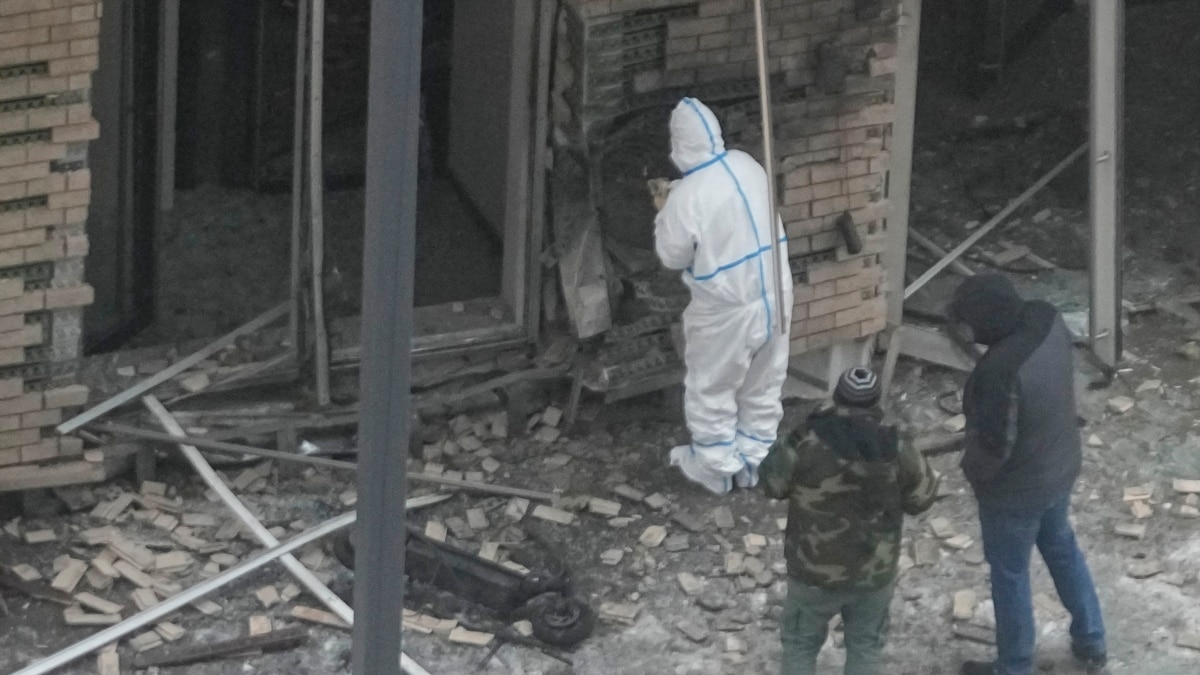Moscow leverages killing of Russian general to spread conspiracy theories

Moscow is using the killing of Russian general Igor Kirillov to push debunked bioweapons conspiracy theories targeting Ukraine and the United States.
On Dec. 17, Kirillov, head of Russia’s nuclear, biological and chemical defense forces, was killed outside an apartment building in Moscow by a bomb hidden in an electric scooter. Kirillov’s assistant was also killed in the blast.
Unnamed Ukrainian officials speaking with media said the Security Service of Ukraine carried out the bombing. Those officials called Kirillov a “legitimate target,” citing his role in ordering Russian forces to deploy banned chemical weapons in Ukraine — a war crime.
On Dec. 19, Russian President Vladimir Putin called the assassination of Kirillov a terrorist act, and he accused Western media of failing to denounce the attack.
Some Western media have called the killing justified and described it as “a legitimate act of defense by a threatened nation.”
To deflect from Kirillov’s role in directing illegal chemical weapons attacks in Ukraine, Moscow is accusing others of taking actions it has undertaken itself.
In this case, Russian Foreign Ministry spokeswoman Maria Zakharov on Dec. 18 said Kirillov had “exposed the Anglo-Saxons and NATO for their criminal activities” related to biological weapons.
“It was Igor Kirillov who exposed the American biological laboratories in Ukraine that developed biological agents for selectively targeting people belonging to specific ethnic groups, including Slavs,” Zakharova said. “It was he who uncovered facts on the use by the Kiev regime of chemical weapons on the frontline, its efforts to create a dirty bomb, and prepare provocations using biological agents.”
That is false.
Russia has never provided evidence that the U.S. developed or aided the development of biological weapons in Ukraine. Russia has likewise never provided evidence Ukraine was developing a “dirty bomb,” which spreads radioactive material, or that Ukrainian forces used chemical weapons against Russian troops.
Moscow began spreading those conspiracy theories as a justification for its invasion, and to cover up its own war crimes.
Weeks after invading Ukraine in February 2022, Kirillov baselessly accused the U.S. of creating bioagents “that can selectively affect various ethnic groups of the population.”
Russia’s Defense Ministry at that time also falsely accused the U.S. of training “migratory birds to migrate from Ukraine to Russia and distribute bacteriological weapons.”
Russian lawmakers also made the implausible claim that Ukrainian soldiers have been turned into “cruel and deadly monsters” through the injection of a secret serum.
In response to those allegations, United Nations High Representative for Disarmament Affairs Izumi Nakamitsu said the U.N. was unaware of any biological weapons research in Ukraine.
Western specialists and journalists have repeatedly debunked Russia’s claims the U.S. is developing bioweapons at dozens of biolabs in Ukraine.
Russian scientists inside and outside Russia likewise said Moscow’s claims that the U.S. is engaged in bioweapons research in Ukraine are fabricated.
As part of its biolabs conspiracy theory, Russia regularly misrepresents the U.S. Department of Defense’s Biological Threat Reduction Program, which started in the 1990s to “reduce legacy threats from nuclear, chemical, and biological weapons left in the Soviet Union’s successor states, including Russia.”
The U.S. Department of State notes Russia was a “foundational partner” of the threat-reduction program despite Moscow’s more recent attempts to portray it as a clandestine means of developing banned weapons.
Moscow’s falsehoods of biological weapons use by the U.S. stretches back decades and was a regular feature of Soviet propaganda.
Moscow’s more recent disinformation campaign has served to distract from Russia’s actual use of chemical weapons in Ukraine, under Kirillov’s supervision.
The United Kingdom, which called Kirillov “a significant mouthpiece for Kremlin disinformation,” sanctioned him in October for his role in flagrantly disregarding the Chemical Weapons Convention (CWC), including the use of the toxic choking agent chloropicrin in Ukraine.
Canada and other nations also sanctioned Kirillov for CWV violations.
In May, the U.S. sanctioned three Russian government entities and four Russian companies associated with Russia’s chemical and biological weapons program.
The U.S. also accused Russian forces of violating the CWC by deploying chloropicrin and riot control agents against Ukrainian forces, saying their repeated use “is probably driven by Russian forces’ desire to dislodge Ukrainian forces from fortified positions and achieve tactical gains on the battlefield.”
Britain and U.S. officials have documented Russian forces openly admitting to chemical warfare on the battlefield, an allegation corroborated by Russian state media reports.
On Dec. 16, Ukrainian prosecutors charged Kirillov for his role in directing an estimated 4,800 chemical weapons attacks against Ukrainian troops since Russia invaded Ukraine, the Kyiv Independent reported, citing a Ukrainian intelligence investigation.
Those attacked resulted in three deaths and more than 2,000 Ukrainian service members being hospitalized.


